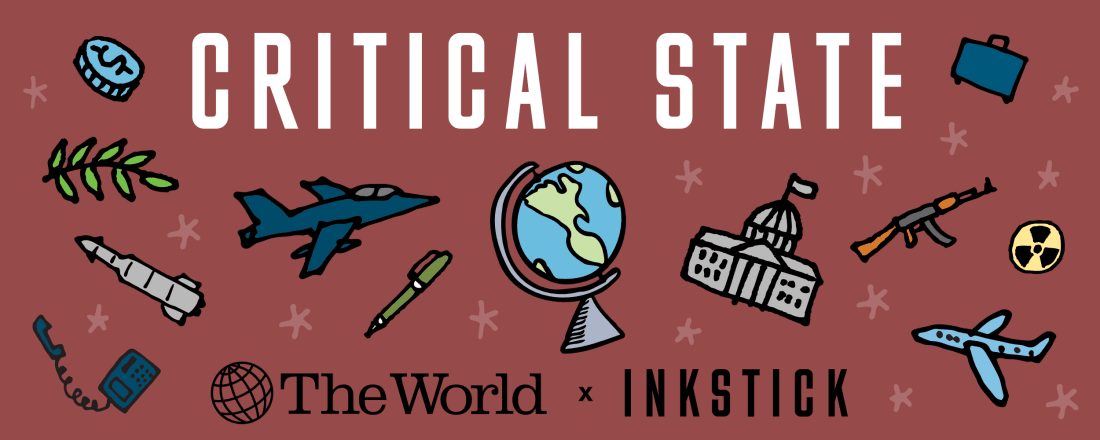|
Critical State: Ukraine Faces a Hard Road in the Sky
If you read just one thing this week … read about Ukraine's shaky plans to give its air force a makeover.
At Politico, Laura Kayali and Veronika Melkozerova reported that Ukraine’s ambitious plan to build a modern air force faced serious complications despite recent agreements with France and Sweden.
President Volodymyr Zelenskyy and Emmanuel Macron signed a letter of intent for up to 100 Rafale fighter jets, while Kyiv also pursued 100 to 150 Gripen E jets from Saab.
Together, these deals could give Ukraine more than 200 Western aircraft, but financial and logistical hurdles loomed. Analysts warned that operating a mixed fleet would complicate training and maintenance, while production backlogs meant deliveries would take years.
Rafales cost up to €250 million per unit, Gripens around €125 million, raising questions about funding amid Ukraine’s cash crunch. EU leaders debated using €140 billion in frozen Russian assets, but consensus was lacking.
Sweden explored financing options, while France ruled out diverting its own jets. Saab even considered Canadian production to speed deliveries.
Experts cautioned that without NATO-level support, sustaining such a fleet would be prohibitively expensive, though diversifying suppliers was seen as safer than relying on a single model.
If You Read One More Thing: Troops Who Refused COVID Jab Get Benefits Back
Cristina Stassis of Military Times reported that thousands of veterans discharged during former President Joe Biden’s administration for refusing the COVID-19 vaccine are now poised to regain eligibility for GI Bill education benefits.
More than 8,000 service members had been separated under the Defense Department’s vaccine mandate, receiving “general, under honorable conditions” discharges that limited access to benefits.
In January, President Donald Trump issued an executive order reinstating those veterans, calling the mandate an unfair burden. Following the order, the Defense Department sent apology letters to over 8,700 affected service members and encouraged some to return to duty.
VA Secretary Doug Collins said the move aimed to “make these veterans whole again,” while Defense Secretary Pete Hegseth condemned the prior discharges as an attack on healthy warfighters.
Currently, 899 veterans were deemed eligible for GI Bill benefits, though officials urged others to seek upgraded discharge status to qualify.
Dozens Killed in US Attacks on Caribbean Shipping Boats
 |
At The Intercept, Nick Turse reported that since September, the Trump administration had waged an undeclared war in the Caribbean and Pacific, killing scores of civilians.
The administration justified the strikes as part of a “non-international armed conflict” against designated terrorist organizations, citing presidential authority and a classified Justice Department opinion.
Critics in Congress and legal experts condemned the attacks as illegal extrajudicial killings, noting the military cannot target civilians who pose no imminent threat. The Pentagon withheld details despite mounting questions.
To track the campaign, The Intercept published a strike log showing 21 attacks, 83 killed, and two captured, with targets ranging from Venezuelan Tren de Aragua to Colombian ELN groups.
Deep Dive: Why Do Some Women Leave the US Coast Guard?
A new dissertation certified by Walden University has taken a deep look at why some women have left the United States Coast Guard before completing their service obligations. Titled “Junior-Level Women Experiences Influencing Their Departure from the US Coast Guard,” Jill L. Lazo’s research is grounded in Public Service Motivation (PSM) theory and aims to step in where, in her words, “there is a notable absence of studies examining the experiences of women in military contexts, particularly within the United States Coast Guard.”
The dissertation draws on interviews with 16 women who had separated from the Coast Guard between four- and eight-years prior. Lazo explains that her purpose was “to understand the experiences, perceived barriers, and facilitators of military service among these women.” She emphasizes that existing studies often relied on active-duty focus groups, which “inadvertently overlooked interviewing women who separated from the USCG.” By centering the voices of those who had already left, she has sought to uncover the silent perspectives shaping attrition.
The findings reveal a complex interplay of motivations and frustrations. Though not the central focus of her study, the dissertation acknowledges sexual assault as part of the broader context of women’s attrition from the US Coast Guard. Lazo writes: “My research study focused on the career development aspect for women, and I did not evaluate it from the perspective of sexual violence.”
That said, the work is situated against existing literature and government reports that have identified sexual harassment and assault as significant factors in women leaving military service. For example, she cites the Government Accountability Office’s finding that “several factors for women exiting military service are traditionally connected to experiences with sexual harassment, sexual assault, pregnancy, inferiority, and abuse, resulting in negative consequences for the USCG.”
Her interviews with the former junior-level Coast Guard women emphasize themes such as betrayal trauma, toxic leadership, lack of support, and ethical burden. While sexual assault was recognized in prior studies as a driver of attrition, Lazo’s project deliberately concentrates on leadership failures, “invisible service,” and organizational culture as the recurring themes behind premature departures.
Given the broader context of her research, Lazo notes that “while PSM remained intact for most participants, their decisions to leave were influenced by factors such as betrayal trauma, ethical burden, and invisible service.” Fourteen of the 16 women continued to pursue careers aligned with public service, underscoring that their departures were not rooted in a loss of civic commitment. Instead, recurring themes emerged: “toxic leadership, lack of support, and inadequate or incompetent leadership.”
One participant describes her experience as “invisible service,” a phrase Lazo adopts to capture the sense that women’s contributions go overlooked or undervalued. Others speak of “betrayal trauma,” reflecting the emotional toll of feeling abandoned by leaders or colleagues. Lazo concludes that “junior-level women’s stories remain unheard and unintentionally excluded from the USCG internal and third-party studies conducted,” a silence that perpetuated attrition.
The dissertation also highlights the role of leadership failures. Lazo writes that “additional recurring themes included toxic leadership, lack of support, and inadequate or incompetent leadership.” These patterns, she argues, undermine women’s ability to thrive in the organization and contribute directly to premature departures. She stresses that “without understanding their needs and expectations, the establishment may only continue to yield or achieve the same results of women separating.”
Her analysis also draws attention to broader structural issues. The Government Accountability Office has reported that “women are 28% more likely to depart the military than men,” a statistic Lazo uses to situate the Coast Guard’s challenges within a wider military context. She also references Admiral Linda Fagan’s acknowledgment that “the active-duty workforce comprises 15% women, with the remaining 85% men,” underscoring the imbalance that has persisted despite decades of policy reforms.
Lazo’s personal connection to the Coast Guard informed her inquiry. She recounts that she had served on active duty from 1993 to 1997 and later in the reserves until 2016, while also holding a civilian position with the Coast Guard. Reflecting on her own career, she explains: “I became hard-hearted but never understood why women got out because of multiple reasons such as geographic stability, to keep their marriage, or to sacrifice their career for their spouse.” Her frustration at seeing women leave propelled her to investigate the phenomenon systematically.
The implications of her study extend beyond the Coast Guard. Lazo argues that “this in-depth qualitative inquiry offers an alternative understanding of career truncation among junior-level women in the USCG.” She suggests that the findings could inform retention strategies across the military and provide insights for scholars and policymakers. The themes of betrayal, invisibility, and ethical burden, she notes, are not unique to the Coast Guard but reflect broader challenges faced by women in public service environments.
Ultimately, Lazo frames her work as a call to action. She concludes that “the study’s implications for positive social change include informing retention strategies and providing insights for scholars, military leaders, and public institutions regarding PSM-related phenomena in service environments.” By amplifying the voices of women who left, she has sought to ensure that their experiences would no longer be ignored in the pursuit of a more inclusive and supportive military.
Show Us the Receipts
At Inkstick, Katy Fallon covered critics’ response to Tony Blair’s proposed role in post-war Gaza, arguing his Iraq legacy and tenure as Quartet envoy (the diplomatic representative of the Middle East Quartet — the United Nations, United States, European Union and Russia) signaled an imperialist approach that marginalized Palestinian sovereignty. The piece explained that Blair’s name surfaced for chairing Donald Trump’s “Board of Peace,” a multinational body to govern Gaza during reconstruction, drawing backlash from Palestinians and dissent within Labour. Sources recounted Blair’s deference to Israeli pressure and his Institute’s controversial advisory ties, including to Egypt and Saudi Arabia. Analysts warned that his record entrenched the isolation of Hamas after the 2006 elections and prioritized Israeli security over Palestinian rights.
In the latest installment of Inkstick’s Adults in a Room series, experts dissected the Institute for Global Affairs’ survey on American views of Trump’s foreign policy. Jonathan Guyer highlighted contradictions between Trump’s rhetoric, elite opinion, and public attitudes, noting opposition to unauthorized military action yet division over strikes in Latin America. Andrew Payne emphasized declining approval of Trump’s record, while Evan Cooper underscored contradictions in public threat perceptions. Jeffrey A. Friedman argued foreign policy remained a political asset so long as conflicts did not escalate. Kelley Beaucar Vlahos warned of neoconservative resurgence, particularly in Latin America, challenging the realism and restraint movement.
Patrick Winn covered Indonesia pressing ahead with building Nusantara, a new capital on Borneo, to replace sinking Jakarta for The World. Construction began three years ago, led by veteran technocrat Basuki Hadimuljono, who described the project as his “baby.” Nusantara was envisioned as a carbon-neutral city with solar power, AI systems, and even drone taxis by 2045. Gen Z civil servants have spearheaded development, while environmental official Myrna Safitri has worked to restore rainforest. Yet critics, including opposition politician Johan Rosihan, have decried the $45 billion cost amid child hunger. President Prabowo Subianto has cut funding, casting doubt on whether Nusantara will fully materialize.
Support Inkstick Today
Inkstick’s nonprofit newsroom is participating in the Institute for Nonprofit News’s annual NewsMatch fundraising campaign again this year. Between now and Dec. 31, your donations will count as double — if you give $100, NewsMatch will match your support. Last year, we raised $6,000. Now, we’re hoping to raise the maximum of $15,000. Will you pitch in to help Inkstick continue exposing the war profiteers, would-be authoritarians, and political grifters undermining democracy?
Critical State is written by Inkstick Media in collaboration with The World.
The World is a weekday public radio show and podcast on global issues, news, and insights from PRX and GBH.
With an online magazine and podcast featuring a diversity of expert voices, Inkstick Media is “foreign policy for the rest of us.”
Critical State is made possible in part by the Carnegie Corporation of New York.
You're currently a free subscriber to Inkstick’s Substack. For the full experience, upgrade your subscription.
